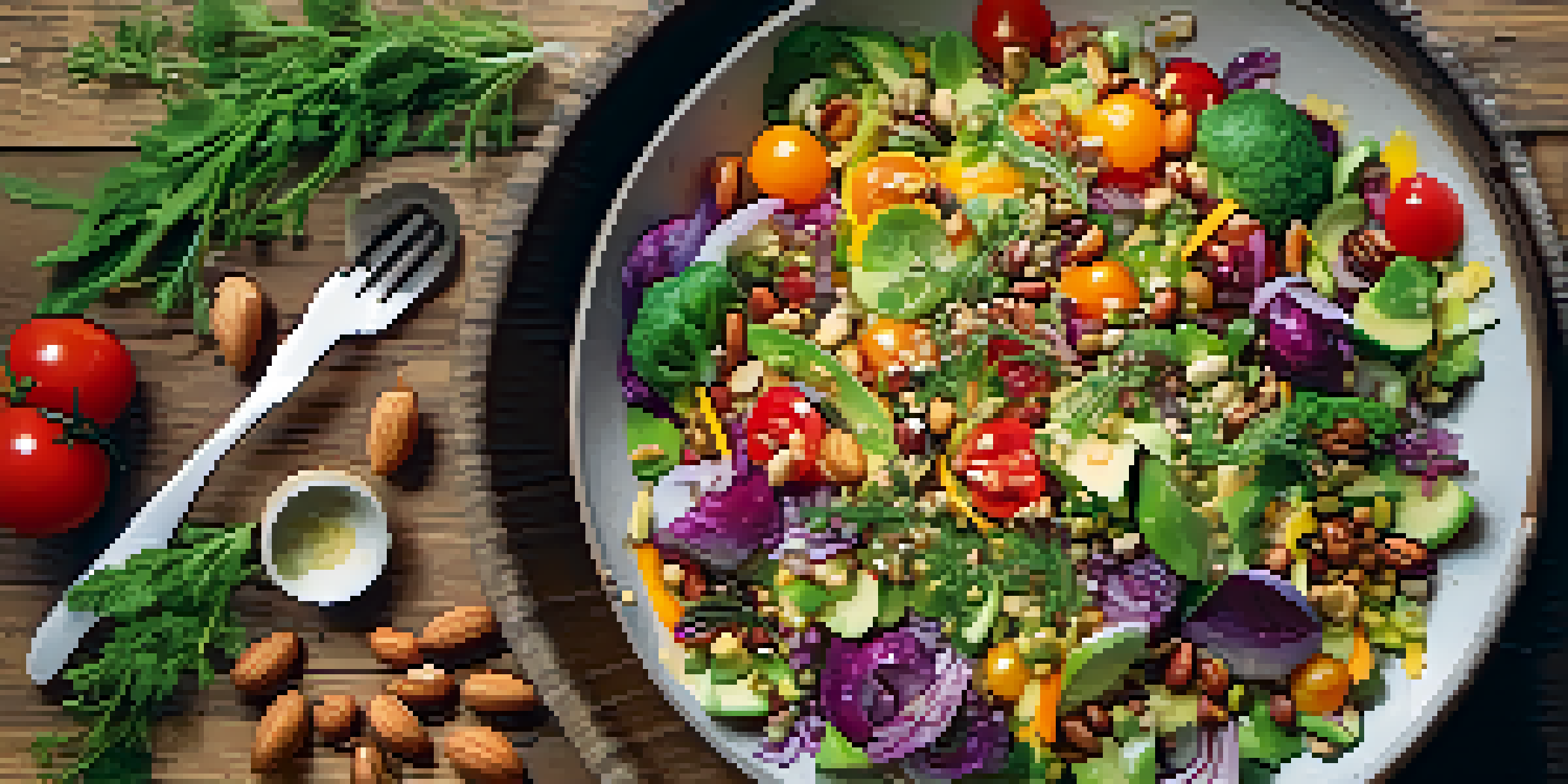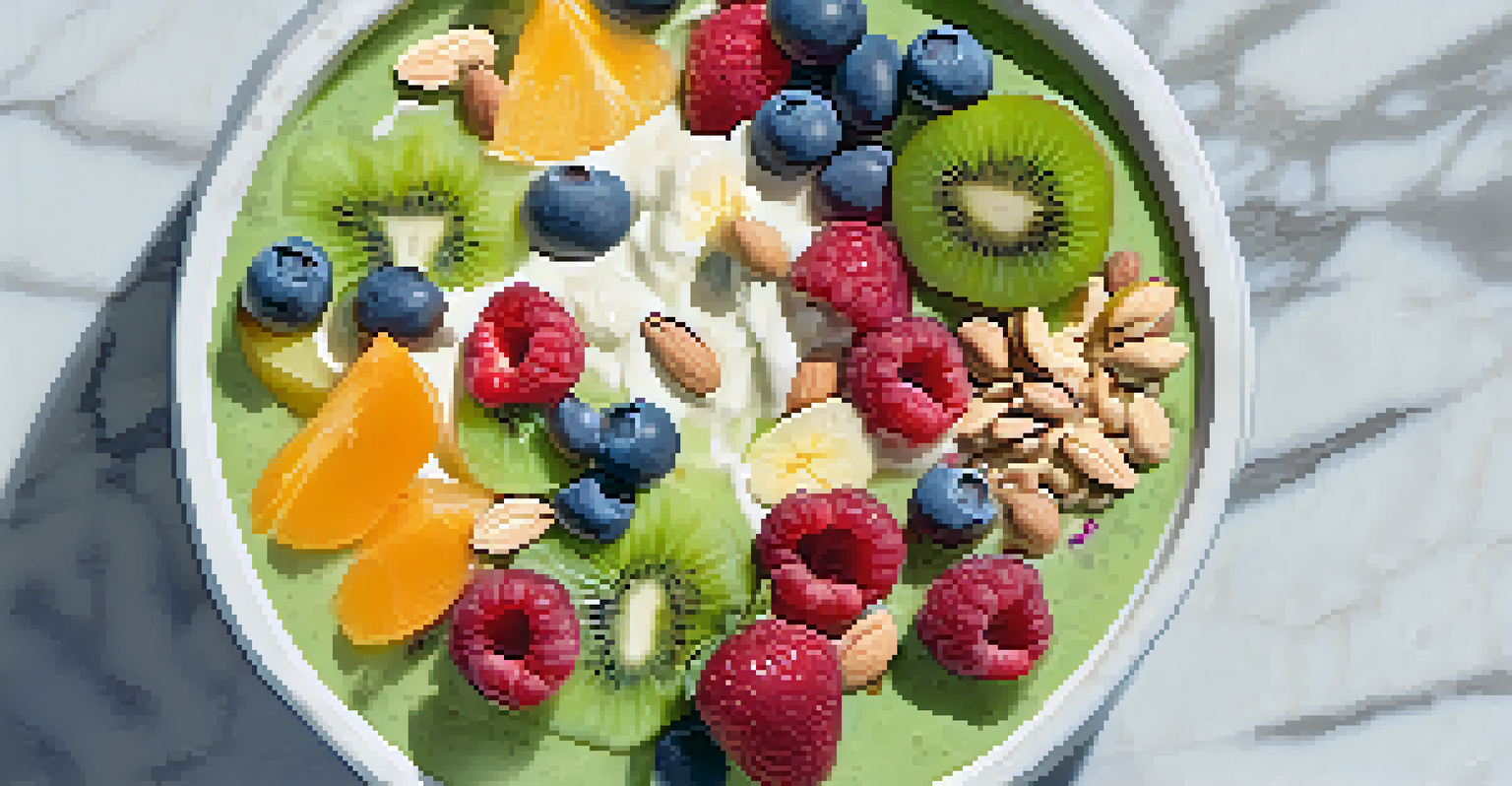Raw Vegan Diets: A Sustainable Approach to Weight Loss

Understanding the Raw Vegan Diet: Key Principles
At its core, a raw vegan diet consists of unprocessed plant foods consumed in their raw state. This means fruits, vegetables, nuts, seeds, and sprouted grains. By avoiding cooked foods, adherents believe they preserve the nutrients and enzymes that can be lost in cooking.
Let food be thy medicine and medicine be thy food.
Essentially, this diet focuses on whole, natural foods that are rich in vitamins and minerals. Think of it as returning to nature's pantry, where everything is fresh and vibrant. The goal isn't just weight loss; it's about nourishing the body with high-quality ingredients.
For someone considering this lifestyle, it’s crucial to understand that the emphasis is on variety. This ensures that you’re getting a balanced intake of essential nutrients while enjoying colorful meals that are satisfying and full of flavor.
Health Benefits of a Raw Vegan Diet
One of the standout benefits of a raw vegan diet is its potential to promote weight loss. By focusing on low-calorie, high-nutrient foods, individuals often find it easier to maintain a caloric deficit without feeling deprived. Your plate is filled with foods that are naturally low in calories yet high in fiber, which helps keep you satisfied.

Moreover, this diet is packed with antioxidants and phytochemicals, which are known to boost overall health. Imagine your body as a garden; the more nutrients you provide, the better it flourishes. This can lead to improved energy levels, better digestion, and clearer skin.
Raw Vegan Diet Boosts Health
A raw vegan diet promotes weight loss and enhances overall well-being through nutrient-rich, unprocessed foods.
It's also worth noting that many people experience a heightened sense of well-being on a raw vegan diet. This could be attributed to the increased intake of fresh produce and the reduction of processed foods, which often harbor unhealthy additives.
Sustainability: Why Raw Veganism is Eco-Friendly
Choosing a raw vegan diet is not just beneficial for personal health; it's also a sustainable choice for the planet. By consuming primarily plants, you're reducing your carbon footprint and minimizing resource consumption compared to meat-based diets. It’s a win-win for both you and Mother Earth!
You are what you eat, so don’t be fast, cheap, easy, or fake.
Furthermore, raw veganism encourages local and seasonal eating. By focusing on whole foods, you often find yourself shopping at local farmers' markets, which supports the community and reduces transportation emissions. Imagine biting into a juicy, sun-ripened tomato that was picked that morning!
This diet also aligns with practices of reducing waste. Many raw food enthusiasts are keen on utilizing the whole plant, from roots to leaves, and minimizing food waste through creative recipes. It’s an approach that not only fills your plate but also honors the environment.
Weight Loss: How to Get Started on a Raw Vegan Diet
If you’re intrigued by the idea of a raw vegan diet for weight loss, starting slowly can be beneficial. Begin by incorporating a few raw meals into your weekly routine. Perhaps start with a vibrant salad or a smoothie filled with leafy greens and fruits to ease into this new way of eating.
As you become more comfortable, consider experimenting with various raw recipes. Think of dishes like zucchini noodles topped with a homemade tomato sauce or a fresh fruit salad bursting with colors. This makes the transition enjoyable and helps you discover the wide range of flavors available.
Sustainable and Eco-Friendly Choice
Adopting a raw vegan lifestyle not only benefits personal health but also reduces environmental impact by encouraging plant-based eating.
It's also important to stay hydrated and maintain balance. Pair your raw foods with plenty of water, and consider supplementing with nuts and seeds for healthy fats and protein. This will help keep your energy levels up and ensure you feel satisfied throughout the day.
Common Misconceptions About Raw Vegan Diets
One common misconception about raw vegan diets is that they are restrictive and not filling. However, when prepared thoughtfully, raw meals can be incredibly diverse and satisfying. From creamy avocado dishes to hearty raw soups, there are countless ways to enjoy a full range of flavors and textures.
Another myth is that raw vegan diets lack sufficient protein. In reality, there are plenty of plant-based sources of protein, such as nuts, seeds, and legumes. For instance, hemp seeds and spirulina are excellent choices that can easily be incorporated into smoothies or salads.
Finally, some people believe that raw vegan diets are expensive. While it can be costly to buy specialty items, focusing on seasonal produce and buying in bulk can make this lifestyle more affordable. It’s all about smart shopping and meal planning to keep your budget in check.
Addressing Nutritional Concerns on a Raw Vegan Diet
While a raw vegan diet can be rich in many nutrients, it's essential to be mindful of potential deficiencies. Nutrients like vitamin B12, iron, and omega-3 fatty acids can be harder to obtain from a raw vegan diet. Therefore, incorporating fortified foods or supplements may be necessary to ensure you’re meeting your nutritional needs.
Another aspect to consider is the balance of macronutrients. Raw diets can sometimes lean heavily on carbohydrates, so it's important to include adequate sources of healthy fats and proteins. This could be achieved through avocados, nuts, and seeds, which not only provide nutrition but also add flavor and texture.
Navigating Nutritional Needs
While rich in many nutrients, a raw vegan diet requires careful planning to avoid deficiencies in vital nutrients like vitamin B12 and iron.
Listening to your body is key. If you notice fatigue or other signs of deficiency, it might be time to reassess your diet. Consulting with a healthcare provider or a registered dietitian can provide tailored advice to ensure you're on the right track.
Tips for Maintaining a Raw Vegan Lifestyle Long-Term
To thrive on a raw vegan diet, meal prep can be your best friend. Taking time to prepare meals in advance can help you stay committed and avoid the temptation of convenience foods. Consider batch preparing snacks like raw energy balls or sliced veggies for quick access.
Joining a community, whether online or locally, can also provide valuable support and inspiration. Sharing recipes, tips, and experiences with others on a similar path can make the journey more enjoyable. Plus, you might discover new favorite dishes along the way!

Lastly, allow yourself flexibility. It’s okay to indulge in cooked foods occasionally or to adapt your diet based on seasonal availability. The goal is not perfection but rather a sustainable and enjoyable lifestyle that nourishes your body and mind.